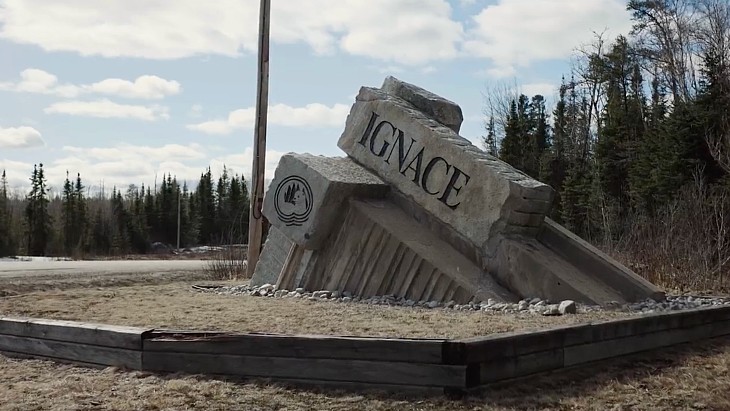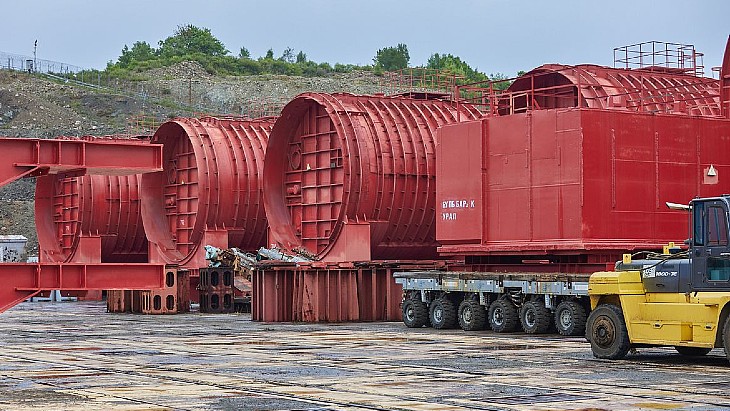International support for rehabilitation of Chernobyl site
A crucial project at the site of the Chernobyl nuclear power plant can now proceed to its final stages thanks to additional pledges by the international donor community at a conference in Kiev yesterday. On the 30th anniversary of the Chernobyl accident, Ukrainian President Petro Poroshenko and President of the European Council Donald Tusk held talks by telephone during which Tusk underlined the EU's "comprehensive support" to Ukraine in overcoming the consequences of the disaster.
On 26 April 1986, the Chernobyl plant suffered the worst nuclear accident in history when a power runaway event wrecked reactor 4. The three remaining reactor units, however, were vital to Ukraine's electricity needs and continued to operate for some years. Unit 2 shut down in 1991, unit 1 in 1996 and unit 3 in 2000.
According to a statement issued by the Ukrainian president's office yesterday, Tusk told Poroshenko the EU remains the main donor in dealing with the aftermath of the accident, the decommissioning of the Chernobyl plant and the "revival" of the local environment. Poroshenko thanked Tusk for the EU's additional contribution of €20 million ($23 million) for completion of construction of a used fuel storage facility, noting that EU assistance had to date reached about €730 million. The European Commission's latest pledge to the Nuclear Safety Account fund is the largest part of the €45 million pledged yesterday by the G7 and the Commission in addition to the existing support.
The Nuclear Safety Account, managed by the London-headquartered European Bank for Reconstruction and Development (EBRD), funds the construction of a storage facility for used nuclear fuel from the operation of the Chernobyl plant. The fund was set up in 1993 to finance nuclear safety projects in Central and Eastern Europe. Today it also provides funds for the decommissioning of the three remaining Chernobyl units. Some 29 countries and the European Commission contribute to the Nuclear Safety Account.
The main project currently supported by the fund is the interim used fuel storage facility (ISF2) at Chernobyl. Its completion is foreseen for 2017. The facility will provide for the processing and storage of the used nuclear fuel from units 1, 2 and 3, which is required for the decommissioning of the plant.
Pledging event
The EBRD said yesterday that the pledging event in Kiev, which was co-chaired by Ukraine and Japan as president of the G7, raised €87.5 million for the completion of ISF2. Of the total amount, €45 million will be provided by the G7 and the European Commission, while another €40 million will be granted by the EBRD subject to the approval by its governors in early May. The remainder is being made up from other bilateral donations.
The Ukrainian government announced further contributions, and other donors also made new pledges. The total cost of the ISF2 project is €400 million.
ISF2, which will be the world's largest dry used fuel storage facility, will process fuel from all of Chernobyl's reactors. Once operational, the facility will process, dry and cut more than 21,000 fuel assemblies from units 1-3, which will then be placed in double walled canisters and stored in concrete modules on site. The used fuel will then be stored safely and securely for at least 100 years. The ISF2 will not be used for storing used nuclear fuel from other nuclear power plants in Ukraine or elsewhere.
Construction works of the facility - designed and built by the US company Holtec - are scheduled to be concluded by the end of 2016. After the plant has received approval by the Ukrainian regulator full processing and storage can commence in the following year, the bank said.
The Nuclear Safety Account was established at the EBRD in 1993 as the bank's first fund to address nuclear safety issues related to Soviet-type reactors. Today, the bank is managing seven such funds, among them the Chernobyl Shelter Fund through which the international community finances the New Safe Confinement. This is currently under construction and will eventually seal unit 4's reactor from the environment to prevent the release of contaminated material and protect the existing shelter from external impacts such as extreme weather. The giant structure is nearing completion and commissioning is expected by late 2017.
EBRD president Suma Chakrabarti said: "Thirty years after the Chernobyl accident it is of the utmost importance to bring the joint efforts by Ukraine and the international community to transform the site into an environmentally safe state to a successful conclusion." ISF2 is an essential part of the bank's work in Chernobyl, Chakrabarti said, and the pledging event has provided the financial means to achieve it.
Ambassador of Japan to Ukraine Shigeki Sumi said the Chernobyl disaster "enabled the world to acknowledge the importance of nuclear safety". On behalf of the G7 members, Sumi commended the progress made under the Chernobyl projects over the past three decades.
Azerbaijan, Belgium, Canada, Denmark, the European Community, Finland, France, Germany, Italy, Japan, the Netherlands, Norway, Russia, Sweden, Switzerland, the UK, Ukraine and the USA have all made donations to the fund.
In a separate statement, Poroshenko said: "We are deeply grateful to the international community, especially the EBRD, Japan as a G7 Presidency, to the United States and other G7 countries, as well as to the European Union, for your valuable and timely help. This is an important act of solidarity with Ukraine, which inspires confidence that jointly we will overcome the consequences of the Chernobyl disaster."
Poroshenko witnessed the signing of the Third Amendment to the Grant Agreement between the Government of Ukraine and State Specialized Enterprise Chernobyl NPP as Recipient and the EBRD. The document was signed by Ostap Semerak, Ukraine's minister of ecology and natural resources, Ihor Hramtokin, director of the SSE Chernobyl NPP, and the EBRD's Chakrabarti.
Poroshenko emphasized that, despite currently difficult economic and political times for Ukraine, the country's cabinet of ministers must provide for the liquidators and victims of the Chernobyl accident.
In a speech to mark the anniversary, he said that the Chernobyl and Fukushima Daiichi nuclear power plant accidents "would remain global scale events for a long time" and the international community "must make every effort to prevent such tragedies in the future".
Given its need to diversify energy supplies and to ensure its energy independence, Ukraine cannot abandon nuclear power, he said. It is necessary, however, to develop the use of new technologies, alternative and non-traditional energy sources, and increase energy efficiency, he said.
Memorial
Poroshenko laid flowers at a memorial mound "To the Heroes of Chernobyl" and a memorial plaque "To the Warriors of Chernobyl". The memorial event was also attended by Andriy Parubiy, chairman of the Ukrainian parliament, the Verkhovna Rada, and Volodymyr Groysman, the country's prime minister, among other political, public and church dignitaries.
Sergey Kirienko, director general of Russian state nuclear corporation Rosatom, sent a message to participants in the memorial service.
"The accident at the Chernobyl nuclear power plant is one of the largest man-made disasters in modern history. Radioactive contamination covered thousands of hectares of agricultural land, considerable damage was caused to the health and wellbeing of millions of people and many were displaced from their homes," Kirienko said. "Today, as we assess the full extent of the tragedy, we are deeply grateful to those who by their heroic work in record time were able to prevent the further spread of radiation. Not all of them are still with us, but the memory of these people will remain forever."
He added: "No matter how difficult the consequences of the Chernobyl accident have been, they could not stop the development of nuclear energy in Russia and the rest of the world. After all, nuclear power plants are one of the most advantageous and, in compliance with all the relevant rules and regulations, the safest and most environmentally friendly ways to generate electricity. Today we can say that we have taken into account the main lesson of Chernobyl - safety as the absolute priority and its consistent implementation at all stages of the life cycle of a nuclear power plant, from design to decommissioning."
Poroshenko presented 12 awards for "significant personal contribution" to overcoming the consequences of the Chernobyl accident.
"It is with deep sorrow that we remember those who sacrificed their lives in the struggle against the nuclear disaster at the Chernobyl nuclear power plant and those who continue fulfilling difficult tasks at the plant and in the exclusion zone," the president said in the course of his memorial speech.
Researched and written
by World Nuclear News
_17992.jpg)
_75800.jpg)







_66488.jpg)


